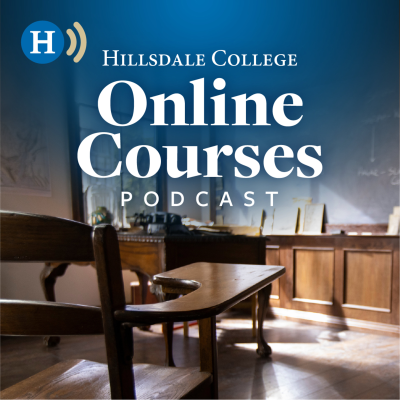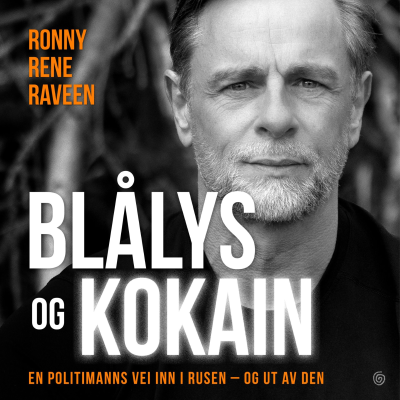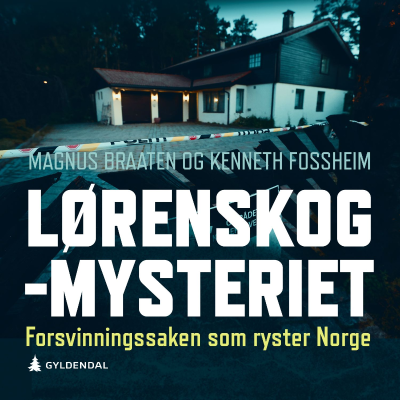
The Hillsdale College Online Courses Podcast
engelsk
Teknologi og vitenskap
Prøv gratis i 14 dager
99 kr / Måned etter prøveperioden.Avslutt når som helst.
- 20 timer lydbøker i måneden
- Eksklusive podkaster
- Gratis podkaster
Les mer The Hillsdale College Online Courses Podcast
Hillsdale College was founded in 1844 with a mission to provide "all who wish to learn" the education necessary to preserve the civil and religious liberties of America. This Podcast, hosted by Hillsdale Online Learning Directors Kyle Murnen and Juan Davalos, expands that mission to a whole new audience. The Hillsdale Online Courses Podcast brings free, full online courses to your podcast feed, with introductory commentary.
Alle episoder
123 EpisoderConstitution 101: Property, Morality, and Religion
On this episode of The Hillsdale College Online Courses Podcast, Jeremiah and Juan discuss whether or not the government should legislate morality before introducing Thomas West. The United States Constitution was designed to secure the natural rights proclaimed in the Declaration of Independence. Signed by Constitutional Convention delegates on September 17, 1787—Constitution Day—it was ratified by the American people and remains the most enduring and successful constitution in history. In this twelve-lecture course, students will examine the political theory of the American Founding and subsequent challenges to that theory throughout American history. Topics covered in this course include: the natural rights theory of the Founding, the meaning of the Declaration and the Constitution, the crisis of the Civil War, the Progressive rejection of the Founding, and the nature and form of modern liberalism. While the first purpose of government is to protect citizens from foreign and domestic threats, it must also undertake other essential actions in order to secure natural rights. These include the protection of property rights, the defense of religious liberty, and the promotion of the moral character necessary to sustain free government. See omnystudio.com/listener [https://omnystudio.com/listener] for privacy information.
Constitution 101: Consent of the Governed and the Separation of Powers
On this episode of The Hillsdale College Online Courses Podcast, Jeremiah and Juan discuss the difference between democracy and republicanism before introducing Ronald J. Pestritto. The United States Constitution was designed to secure the natural rights proclaimed in the Declaration of Independence. Signed by Constitutional Convention delegates on September 17, 1787—Constitution Day—it was ratified by the American people and remains the most enduring and successful constitution in history. In this twelve-lecture course, students will examine the political theory of the American Founding and subsequent challenges to that theory throughout American history. Topics covered in this course include: the natural rights theory of the Founding, the meaning of the Declaration and the Constitution, the crisis of the Civil War, the Progressive rejection of the Founding, and the nature and form of modern liberalism. The Framers understood that the “latent causes of faction . . . are sown in the nature of man.” Consequently, the Constitution establishes a number of institutional mechanisms such as representation and separation of powers to control the effects of faction. In so doing, the Constitution improved upon previous models of republican government. See omnystudio.com/listener [https://omnystudio.com/listener] for privacy information.
Constitution 101: Majority Tyranny and the Necessity of the Union
On this episode of The Hillsdale College Online Courses Podcast, Jeremiah and Juan discuss how The Federalist influenced the Constitutional Convention before introducing Ronald J. Pestritto. The United States Constitution was designed to secure the natural rights proclaimed in the Declaration of Independence. Signed by Constitutional Convention delegates on September 17, 1787—Constitution Day—it was ratified by the American people and remains the most enduring and successful constitution in history. In this twelve-lecture course, students will examine the political theory of the American Founding and subsequent challenges to that theory throughout American history. Topics covered in this course include: the natural rights theory of the Founding, the meaning of the Declaration and the Constitution, the crisis of the Civil War, the Progressive rejection of the Founding, and the nature and form of modern liberalism. The Articles of Confederation was America’s first attempt at establishing a national union. However, in many of the states, unchecked legislative majorities frequently trampled on the natural rights of minorities and disregarded the nearly powerless federal government. This experience of unstable and unjust government led to calls for a firmer union. See omnystudio.com/listener [https://omnystudio.com/listener] for privacy information.
Constitution 101: Natural Rights and the American Revolution
On this episode of The Hillsdale College Online Courses Podcast, Jeremiah and Juan discuss how the concept of natural rights informed the American Founding before introducing Thomas G. West. The United States Constitution was designed to secure the natural rights proclaimed in the Declaration of Independence. Signed by Constitutional Convention delegates on September 17, 1787—Constitution Day—it was ratified by the American people and remains the most enduring and successful constitution in history. In this twelve-lecture course, students will examine the political theory of the American Founding and subsequent challenges to that theory throughout American history. Topics covered in this course include: the natural rights theory of the Founding, the meaning of the Declaration and the Constitution, the crisis of the Civil War, the Progressive rejection of the Founding, and the nature and form of modern liberalism. The principle of equality—which means no person may rule over another without his consent—is central to the political theory of the American Founding. Not only did it justify the Revolution, it also led to the creation of a government whose purpose is securing the natural rights of its citizens. See omnystudio.com/listener [https://omnystudio.com/listener] for privacy information.
Constitution 101: The Theory of the Declaration and the Constitution
On this episode of The Hillsdale College Online Courses Podcast, Jeremiah and Juan introduce the course "Constitution 101". The United States Constitution was designed to secure the natural rights proclaimed in the Declaration of Independence. Signed by Constitutional Convention delegates on September 17, 1787—Constitution Day—it was ratified by the American people and remains the most enduring and successful constitution in history. In this twelve-lecture course, students will examine the political theory of the American Founding and subsequent challenges to that theory throughout American history. Topics covered in this course include: the natural rights theory of the Founding, the meaning of the Declaration and the Constitution, the crisis of the Civil War, the Progressive rejection of the Founding, and the nature and form of modern liberalism. The form of government prescribed by the Constitution is based on the timeless principles of the Declaration of Independence. These two documents establish the formal and final causes of the United States and make possible the freedom that is the birthright of all Americans. See omnystudio.com/listener [https://omnystudio.com/listener] for privacy information.
Velg abonnementet ditt
Premium
20 timer lydbøker
Eksklusive podkaster
Gratis podkaster
Avslutt når som helst
Prøv gratis i 14 dager
Deretter 99 kr / måned
Premium Plus
100 timer lydbøker
Eksklusive podkaster
Gratis podkaster
Avslutt når som helst
Prøv gratis i 14 dager
Deretter 169 kr / måned
Prøv gratis i 14 dager. 99 kr / Måned etter prøveperioden. Avslutt når som helst.















































